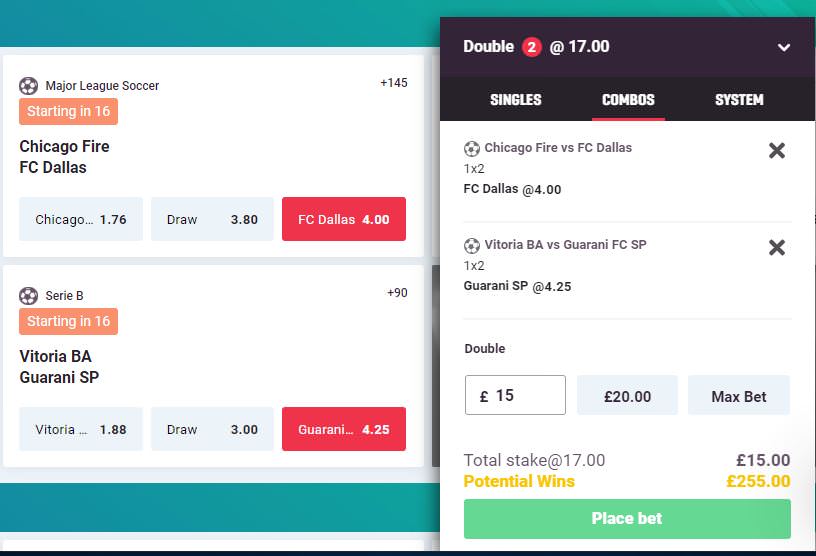Betting on two selections together as a double bet has a higher payout than if you were to bet on the two selections separately. This is why double bets are fairly common amongst punters.
Double Bet Calculator
The way a double bet works is straightforward. You choose two selections – let’s call the first one A and the second one B – and place your bet. If selection A wins, your winnings from that first bet will be used as the stake for your second bet. If selection A loses, you’ll lose your winnings and therefore there won’t be any money to use as a stake for the second part of the double bet, regardless of whether selection B goes on to win or not.
Figuring out the payout of a double bet should be easy enough. Check with a double bet calculator to make sure you’ve got it right. A quick online search will find lots of easy-to-use double bet calculators for you.
Bet Calculator Double
To give an example of how a double bet works, let’s say you’re betting £10 on the two selections. To keep things simple, we’ll have the odds for both selections at 1/1 and we’ll say that both selections win. For selection A, your first bet pays you £20, of which £10 is your initial bet and £10 is profit. This £20 is used as the stake for selection B’s bet. Since it wins, you’ll receive a payout of £40. Of this, £10 is your original stake and the remaining £30 is profit.
Let’s look at how much you’d earn if you place bets on the two selections separately. A £10 bet on a selection at odds of 1/1 pays out £20, half of which is profit, half of which is your bet. For two of these bets, you’re looking at a total profit of £20. This is £10 less than if you were to have placed a double bet on these two selections.
When using a free bet calculator for double bets, it’s only your initial bet you’ll need to enter. This is because the double bet is technically just one bet with one stake, despite it covering two selections. Bet calculators for double bets are the quickest and easiest way to find out how much profit you stand to make from this type of bet.
Each Way Double Bet Calculator
Each way bets are popular in horse racing and offer some insurance. When placing an each way bet, you’re placing two separate bets: one on the horse winning the overall race and one on the horse placing. If a horse places, this means that it doesn’t win, but it finishes in one of the top positions decided by the bookie. Some bookies, for example, will have the horse place if it comes second to fifth, though this can vary depending on where you’re betting. If your horse places, you’ll win your place bet but will lose your win bet. If your horse wins, you’ll win both of your bets and will make a profit.
Each way double bets work in the same way as standard double bets. The only exception is that for each selection, you’re placing two bets: one on the horse (or competitor) winning, and the other on it to place. To find an each way double bet calculator, simply look for a standard double bet calculator. You’ll see an option to place your bet as an each way bet. Calculating the payout for an each way double bet isn’t as straightforward as it is for standard double bets. This is because the odds for the placing bet are usually smaller than for the win bet. Therefore, you may want to make use of each way double bet calculators to help you out.
How To Place A Double Bet
As its name suggests, a double bet is simply a bet that’s made up of two selections; it’s basically two bets in one. It’s a type of accumulator bet, which is any sort of bet that involves more than one selection. To win these bets, both of your selections need to win; if one of your selection loses, you won’t win. Its essentially a bet to win option.
The way double bets work is that the winnings from your first selection are used as the stake for the second selection. These bets do have the potential to be quite lucrative. In fact, placing a double bet can be more rewarding than placing two single bets on the same events.
However, the chance of winning a double bet are usually somewhat lower than the chance of winning a single bet. This is simply because you need to be successful/lucky in two separate bets for your double bet to pay out.
You will know what to know how to place a double bet and maximising your chance of winning. Placing double bets is very straightforward indeed. Once you’re logged into a betting site, simply find the two selections you want your double bet to cover. Click on the odds for each bet to have it added to your bet slip, which is usually displayed on the right.
Head over to your bet slip and you’ll see your two selections listed. You can place the bets separately, or you can place them together as a double bet. If your bet slip has more than one bet in it, an option will appear for you to group your bets together as an accumulator. With two bets in your bet slip, you’ll be able to place a double bet. Simply enter the amount of money you wish to bet with and confirm.

How to Work Out A Double Bet
Here’s an example of a typical double bet. Let’s say there are two football or cricket matches you want to bet on. You think team A’s going to win the first match and that team B’s going to win the second.
You place a £10 double bet. Your first selection is for team A winning the first match at odds of 2/1. Team A wins and your total payout is £30 (£20 in winnings plus your initial £10 bet). This £30 is used as the stake for your second selection, which is team B winning the second match at odds of 4/1. Team B goes on to win and you receive £150 (£120 in winnings, plus your £30 bet). Since you started off with a £10 bet, you’ve made a profit of £140.
If you’d wagered on these two matches separately and they’d both won, your potential profit would be a lot lower. Let’s say you bet the same amount of money, but splitting it across both matches. With £5 on the first match at odds of 2/1, you would make a £10 profit. For the second match at odds of 4/1, you would make a £20 profit. Therefore, your overall potential profit from betting on these two events separately would be £30, which is significantly lower than £140.
Since double bets require both bets to be successful, if just one of these isn’t successful you won’t get paid. Let’s say, for example, you’ve placed a £10 double bet on two horse races. The first selection is for a horse winning with odds of 3/1; the second selection is for a horse winning in a different race with odds of 5/1. If the first horse were to lose, you’d lose your bet and there’d be no money to use as your stake for the second selection. If the first horse won, you’d have a stake of £40 for your second selection. However, if this second horse were to lose, you’d simply end up losing your new £40 wager.
Doubles Bet
Doubles bet are the most reliable type of accumulator bet, since they involve just two selections; other accumulators involve more selections and can have lower chances of winning. With double bets, calculating your wins is easy enough to do. Most betting sites will have a betting calculator that you can use to determine what your payout will be for a particular bet. If you’d like to work out your potential double bet payout for yourself, here’s what you need to do.
Firstly, decide how much you’re going to bet with. Then decide what your first selection will be and what your second selection will be. Remember than for doubles bet, your overall payout for your first selection is used as the stake for the selection.
To calculate your payout, look at the odds. In the UK, they’re most commonly represented as fractions, though they can be represented as decimal numbers and positive/negative numbers as well. For this, we’ll stick to fractional odds.
The number on the right of the fraction represents your stake; the number on the left represents your potential winnings. Let’s say you’re betting with £10 and the odds are 5/2. To work out your winnings, divide your stake by the number on the right (2) and multiply the result by the number on the left (5). For this bet, your winnings would be £25. Remember that whenever you win a bet, your initial stake is returned to you. Therefore, you’d actually be paid £35 – £25 of this is your winnings and the remaining £10 is your initial stake.
It’s worth pointing out that it’s the overall payout for the first selection that’s used as the stake for the second selection. In other words, it’s your winnings and your initial bet. Continuing with the example above, you would use £35 as the stake for your second selection.
Double Odds Calculator
Odds are expressed in three ways: decimal, fractional or American. A double bet odds calculator will let you switch between these three freely. Decimals odds are most common throughout mainland Europe, Canada and Australia, while fractional odds are most commonly used in the UK and Ireland and American odds, obviously, are favoured in the USA. No matter what type of odds you’re used to, you’ll be able to use a double bet odds calculator with ease.
With double bets, you can expect to receive a profit of three times your stake if both selections are successful. You may want to bear this in mind when determining the size of your stake.
Win Double Bet Calculator
So to win a double bet, both of your selections need to be successful, i.e. win their respective events. If either one of them doesn’t, or both of them don’t, your bet won’t win and you’ll lose your initial stake. To guarantee a return, you need two winnings: selection A and selection B. Double bets are slightly riskier than placing events on two selections separately, though there’s the potential to make more money. To work out how much you can win, double bet calculators can come in hand. These online tools determine your potential payout in an instant. Use a win double bet calculator to find out how much your double bet, or each way double bet, can pay you.
Claim +420 exclusive
NO DEPOSIT FREE SPINS
This offer is not valid for residents of Great Britain. By subscribing you are certifying that you are over 18 years. All emails include an unsubscribe link. Please read our privacy and cookies policy.
This site is protected by reCAPTCHA and the Google Privacy Policy and Terms of Service apply.
Terms & Conditions


